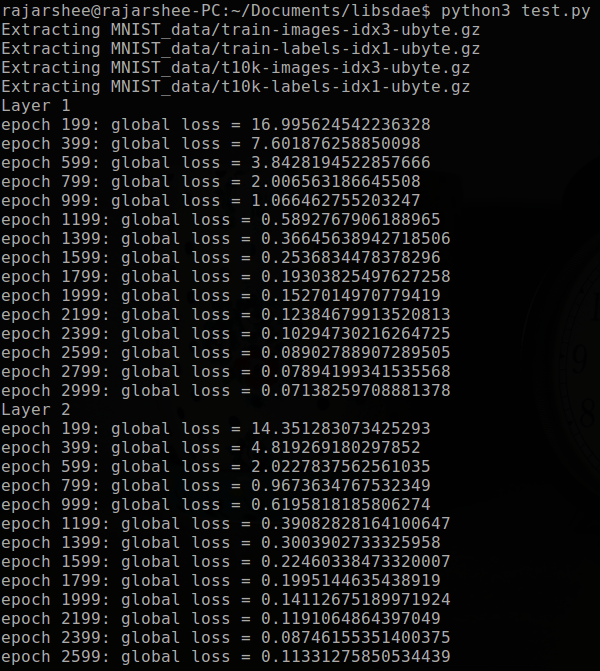A simple Tensorflow based library for Deep autoencoder and denoising AE. Library follows sklearn style.
- Tensorflow 1.0 is needed.
- Supports both Python 2.7 and 3.4+ . Inform if it doesn't.
pip install git+https://github.com/rajarsheem/libsdae.git
This is the origin install way, if you want to install this repo, please use git clone or replace deepstackencoder file of origin repo with this repo.
test.ipynb has small example where both a tiny and a large dataset is used.
from deepautoencoder import StackedAutoEncoder
model = StackedAutoEncoder(dims=[5,6], activations=['relu', 'relu'], noise='gaussian', epoch=[10000,500],
loss='rmse', lr=0.007, batch_size=50, print_step=2000)
# usage 1 - encoding same data
result = model.fit_transform(x)
# usage 2 - fitting on one dataset and transforming (encoding) on another data
model.fit(x)
result = model.transform(np.random.rand(5, x.shape[1]))- If noise is not given, it becomes an autoencoder instead of denoising autoencoder.
- dims refers to the dimenstions of hidden layers. (3 layers in this case)
- noise = (optional)['gaussian', 'mask-0.4', 'swap-0.5']. mask-0.4(swap) means 40% of bits will be masked(swaped) for each example.
- x_ is the encoded feature representation of x.
- loss = (optional) reconstruction error. rmse or softmax with cross entropy are allowed. default is rmse.
- print_step is the no. of steps to skip between two loss prints.
- activations can be 'sigmoid', 'softmax', 'tanh' and 'relu'.
- batch_size is the size of batch in every epoch
- Note that while running, global loss means the loss on the total dataset and not on a specific batch.
- epoch is a list denoting the no. of iterations for each layer.
- Stacked Denoising Autoencoders: Learning Useful Representations in a Deep Network with a Local Denoising Criterion by P. Vincent, H. Larochelle, I. Lajoie, Y. Bengio and P. Manzagol (Journal of Machine Learning Research 11 (2010) 3371-3408)
You are free to contribute by starting a pull request. Some suggestions are:
- Variational Autoencoders
- Recurrent Autoencoders.
